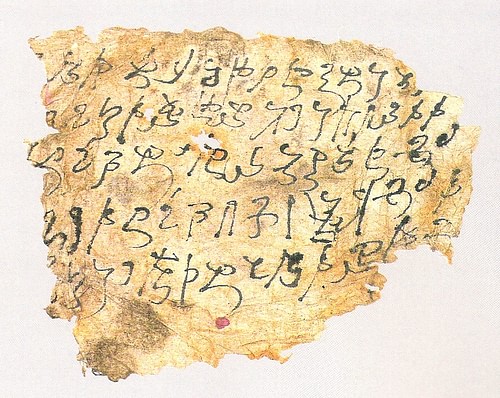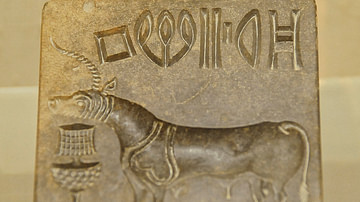
The Kharosthi script (also known as 'Indo-Bactrian' script) was a writing system originally developed in present-day northern Pakistan, sometime between the 4th and 3rd century BCE. Kharosthi was employed to represent a form of Prakrit (Middle Indic), an Indo-Aryan language. It had a wide but irregular distribution along northern Pakistan, eastern Afghanistan, northwest India, and Central Asia.
Origin of the Kharosthi Script
The earliest recognizable examples of Kharosthi have been located in the region of Gandhara (northern Pakistan), recorded in the Ashokan edicts (mid-3rd century BCE) at the towns of Mansehra and Shahbazgarhi. Outside the Indian northwest, Ashokan inscriptions were in Prakrit, written in the Brahmi script, but towards the Gandhara region these inscriptions are written using the Kharosthi script, also in the Prakrit language, or sometimes even translated directly into Aramaic or Greek. This is not surprising considering that Kharosthi originated under the influence of the Semitic script used by the Persians.
When the Achaemenid Persians took control of Gandhara and the Indus between the late 6th and early 5th century BCE, they brought with them the Aramaic language that was employed as the standard means of communication for official records. On the written level, Aramaic was represented using a north Semitic script. Kharosthi is an adaptation of this north Semitic script, customized to suit the phonetic of Gandhari, a Prakrit dialect used in Gandhara and its vicinity.
Development of the Kharosthi Script
As the Brahmi script dominated most of India outside the northwest, Kharosthi remained dominant in this region: most inscriptions between c. 200 BCE and 200 CE in this area were written in Kharosthi.
Kharosthi arrived in several areas in central Asia, aided by the flourishing commerce of the Silk Road. It was employed in the kingdom of Shanshan (founded in the 1st century BCE) located in the southern and eastern area of the Tarim basin. Most texts found in Shanshan are written in the Chinese script, but some Kharosthi examples were retrieved from the ancient cities of Niya and Endere, in the western section of Shanshan.
Kharosthi inscriptions dated from the 3rd century CE have also been found in Sogdiana and Bactria during the time of the Kushan empire (1st to 4th century CE). There are also Kharosthi examples located further east in Luoyang, China, dated to the Han dynasty during the reign of emperor Ling (168-189 CE).
Material Form & Use
The oldest examples of Kharosthi found in Gandhara are displayed on the Ashokan edicts, carved on rock pillars dated to the mid-3rd century BCE. During the following century, Kharosthi was widely used on coin inscriptions when a currency system was introduced in Gandhara after the establishment of the short-lived Indo-Greek kingdom. The coins issued had bilingual inscriptions in both Greek and Prakrit, which was sometimes written with either Brahmi or Kharosthi characters.
Some isolated examples of Kharosthi have been identified outside northwest India. In the Bharhut village (Madhya Pradesh, India), Kharosthi characters employed in the context of masonry have been recorded. There are also examples of Kharosthi inscriptions on pottery found in Bengal.
In Miran, an ancient town at the edge of the Taklamakan desert in the Xinjiang region of China, examples of Kharosthi texts written on silk have been retrieved. Further east, in the Chinese city of Luoyang, examples of Kharosthi inscriptions have been recorded on a wall around a well. This text describes the lives of a group of Buddhist monks who lived in the area in the 2nd century CE.
Demise of the Kharosthi Script
Kharosthi was contemporary with the Brahmi script, an Indian writing system widely used in most of India outside the northwest region where Kharosthi remained dominant. While the influence of the Brahmi script increased and spread beyond India, the Kharosthi script remained confined to specific locations. By the 4th century CE, Kharosthi had become either extinct or was replaced by other writing systems in most areas where it used to be employed. To date, no Kharosthi derived scripts have been identified.







